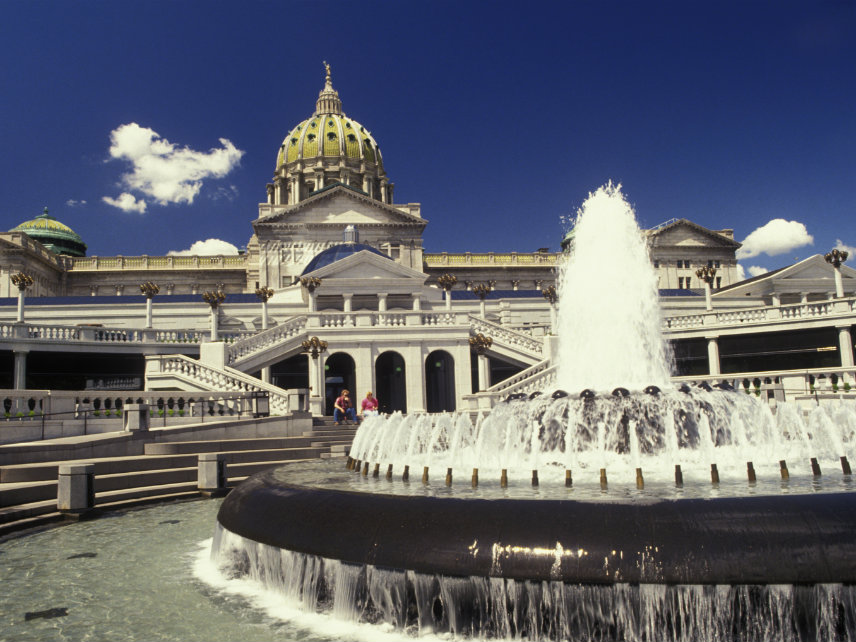Pennsylvania Wants to Get Drunk on Debt
Gov. Tom Wolf's plan to borrow $1.2 billion against future state-run liquor store profits is fiscally risky and legally questionable.

A decade ago, state lawmakers in Pennsylvania faced a budget deficit and political pressure to privatize the Pennsylvania Turnpike, which was then run as a quasi-independent state agency.
Selling the nation's oldest toll highway to a private operator would have netted billions for the state, but lawmakers and then-Gov. Ed Rendell thought they had a better idea. They sold bonds backed by future toll revenues—a process known in investment lingo as "securitizing"—and turned the Pennsylvania Turnpike into an off-the-books source of borrowing that would, in theory, provide a steady stream of revenue for 50 years.
It didn't work out that way.
Turnpike tolls climbed every year to meet the new debt obligations since Act 44 passed in 2007. A drive from Philadelphia to Pittsburgh today costs more than double what it did a decade ago. After state audits showed future toll increases would be unsustainable, lawmakers in 2013 had the turnpike subsumed into the state Department of Transportation.
Even with that minor fix, Act 44 has become a case study—see this report from the University of Pennsylvania published last year—in what not to do when states take on debt.
Lawmakers in Pennsylvania, however, are preparing to make nearly the same mistake.
Facing a $1.2 billion budget deficit and political pressure to privatize Pennsylvania's state-run liquor system, Gov. Tom Wolf wants to securitize future liquor sales to eliminate the debt. Borrowing, Wolf said last week, would "pay off nearly all of our prior year deficit and significantly reduce the need for additional temporary borrowing to pay our bills."
The analogy with the turnpike isn't a perfect one. Motorists have options other than toll roads when they want to drive across the state. The Pennsylvania Liquor Control Board is a monopoly on liquor store operators and wine and spirits wholesalers that kicked in $210 million to state coffers last year.
But like the Turnpike deal, borrowing risks long-term problems if the Pennsylvania Liquor Control Board can't meet its debt obligations. And issuing bonds would also further entrench state-run liquor stores, an outdated system most states abandoned long ago.
The state faces a budget crisis because lawmakers in June delivered a $32 billion spending plan to the governor but have failed to pass a bill specifying how the budget will be funded. Wolf is asking for new taxes on gas drillers and hotels to close the budget gap.
"There are definitely questions," House GOP spokesman Steve Miskin told WITF's Katie Meyer this week. "The main concern is, is it legal, and can he unilaterally do it?"
The better question is whether or not he should.
Wolf's borrowing plan correctly points out the amount the Liquor Control Board contributes to the budget each year is less than what would be required to make annual payments on the $1.2 billion in borrowing. Wolf's top budget adviser told PennLive's Charlie Thompson that the annual debt service would amount to about $85 million.
True, but shortsighted. Funds siphoned off to pay for new debt service will not be available for future state budgets.
And a new paper published Thursday by Jarrett Dieterle, a fellow at the R Street Institute in Washington, D.C., questions whether state-run liquor operations charging what amounts to secret taxes in the form of price mark-ups on alcohol are illegal.
The PLCB used to apply a 30 percent mark-up on the wholesale price of liquor, but recently switched to a variable markup that fluctuates from product to product. Either way, that added fee is "a tax in everything but name," says Dieterle.
The mark-up system lacks accountability, because taxpayers can't remove PLCB board members at the ballot box. A lawsuit built on Dieterle's premise could undermine the state's ability to continue collecting this unseen tax.
"This setup ultimately allows state officials to hide the bill from taxpayers and to rely on what amounts to backdoor taxes to plug budget gaps, all while avoiding politically contentious policy decisions," Dieterle says.
Borrowing against the liquor system also serves a political purpose. Republicans in Harrisburg have been trying to privatize the state's liquor monopoly for years, but have faced opposition from Democrats and their public sector union allies. The state-run liquor stores are staffed by public sector workers who would likely lose their jobs if privatization passed.
Burying the Pennsylvania Turnpike in a mountain of debt effectively ended the private operator debate. Piling $1.2 billion of debt onto the liquor system—and those $85 million annual payments—would likely chill the ongoing debate over its privatization.
Bonds could lock-in the current system with language preventing the state from selling the liquor system, says Nathan Benefield, vice president of the Commonwealth Foundation, a free market think tank in Harrisburg that favors privatization. Even if that doesn't happen, the debt "could make privatization more difficult—or at least more inconvenient, as you'd have to price annual license fees high enough to generate the revenue to pay off the bonds."
Perhaps the best reason to be skeptical about the plan is that it does nothing to correct the underlying imbalance in the state budget. Even as tax collections hit record high levels, spending continues to outstrip Pennsylvania's (and many other states') revenue.
With Republicans in control of the legislature and a Democrat in the governor's mansion, it's unlikely spending cuts or massive tax hikes will find their way into law.
A real solution is sorely needed, one not dependent on financially dicey, questionably legal borrowing to paper over a major budget hole. The state has been down this road before; lawmakers should know better this time around.


Show Comments (26)